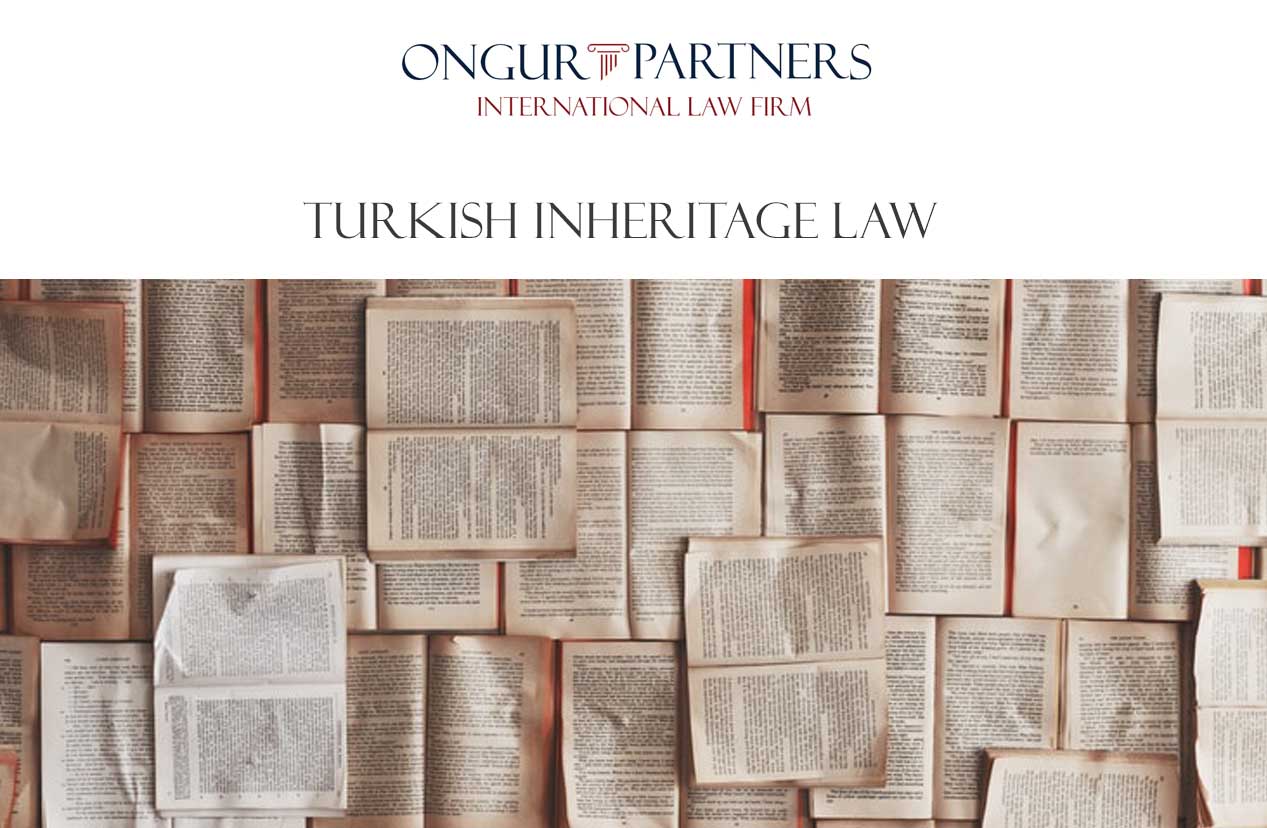Turkish Inheritance Law
INTRODUCTION
This paper aims to introduce brief information regarding fundamental principles of Turkish inheritance law, and official procedures regarding inheritance proceedings. Before taking any decision on your heir ship rights in Turkey, we highly recommend obtaining clear advice from a Turkish inheritance lawyer to avoid and complexity.
It is a fact that foreign parties involved heritage cases, implementation of a testament or last will in Turkey, and distribution of the heritage requests are increased dramatically. Therefore we receive many questions regarding the determination of heirship in Turkey, the certificate of inheritance in Turkey, distribution shares of heirs in Turkish law, and the implementation of last will letters in Turkey.
We hereby inform that the disputes in the succession processes, inheritor rights might have a complex nature, and some of them need to proceed with special procedures by an inheritance lawyer in Turkey. In such cases, taking legal assistance from an experienced Turkish inheritance lawyer is highly recommended.
SOURCES AND EXTENT OF TURKISH INHERITANCE LAW
In the scope of this article, firstly the sources and legal regulations of the Turkish inheritance law, Turkish last will law, inheritors rights, shares of the inheritors in Turkish law, transfer of the real estate after death, will be determined, and accordingly, the heritage distribution procedures would be explained in general terms.
Sources
Rules regarding Turkish inheritance law have been codified in the Turkish Civil Code (hereinafter TCC) (dated 22/11/2001 and numbered 4721). Yet to interpret the regulations of TCC, it is often needed to refer to the general principles of law, the Turkish Code of Obligations (dated 11 January 2011 and numbered 6098), and relevant tax regulations.
In addition to these regulations regarding rights of inheritors in Turkey, in cases involving international parties or multinational individuals, the regulations in the Turkish International Private and Procedure Law (dated 27 November 2007 and numbered 5718) should also be taken into consideration.
In addition to these national sources, to prevent disputes in heritage proceedings in Turkey involving an international tool; countries have made bilateral and multilateral agreements regarding the law to be applied in such cases which should be taken into account accordingly with the special circumstances of the dispute in terms of inheritance proceeding and testament wills in Turkey.
In which cases the Turkish Inheritance Law would be implemented:
According to Article 20 of the Turkish International Private and Procedure Law, as a general rule, the national law of the deceased shall govern inheritance.[2] In this sense, while the inheritance proceedings of foreigners passing away in Turkey will be governed by the national law of the legator, Turkish rules will be applied for Turkish citizens’ who pass away abroad.
Yet in addition to this general rule; there are important exceptions that have serious implications for the inheritance proceedings. The first of these exceptions is about the immovable property such as real estate, house located in Turkey. According to article 20 of the Turkish International Private and Procedure Law irrespective of the citizenship of the owner/legator for the immovable property located in the Turkey Turkish law shall be applied.[3]
Moreover, it is foreseen in the same article that provisions relating to the reasons for opening, acquisition, and distribution of succession shall be governed by the law of Turkey where the estate is located.[4]
Therefore, it is possible to conclude that although the citizenship of the deceased person is the key determinant; especially for the estate located in Turkey (whether left by a citizen or a foreigner); Turkish law will have a large scope of application.
DEFINITIONS
Before presenting the essentials of the Turkish inheritance law, it would be proper to provide definitions of some fundamental concepts. According to Turkish Law; the “legator” is defined as the deceased person who left the heritage to his/her inheritors. As the subject of Turkish Will Law’s subject, inheritors are those who have a claim on the heritage of the legator. Turkish Civil Code defines four types of legal inheritors which are;
- Blood relatives are the first group of legal inheritors and heritor which consist of persons who are related to the deceased by birth[5].
- Surviving spouse is also entitled to claim rights from the inheritance with the below-presented rates.[6]
- Adopted child/children of the legator or deceased are also entitled to inheritance in the same conditions with the descendants.[7]
- The country treasury is the inheritor of those who passed away without any inheritor.[8]
In addition to that, the term “estate” can be defined as all assets, rights, and obligations left from the deceased person as soon as they are legally available for inheritance.
SHARES OF INHERITANCE IN TURKISH LAW
Above presented inheritors are grouped in three degrees: First degree consisting of the descendants, second degree consisting of the deceased person’s parents and their offspring, third-degree consisting of the deceased person’s grandparents and their offspring. And herein it should be stated that surviving spouse is not included in the system of degrees and shall have a share irrespective of other inheritors’ degrees. The respective shares of inheritors needs to be calculated by an expert inheritance lawyer in Turkey.[9]
PROCEDURES
Claiming the share from the heritage and acquisition of the estate requires several formal proceedings involving different authorities and courts. Therefore legal assistance during these proceedings is essential.
The first transaction to do before proceeding with the inheritance procedures is to report the loss of the deceased to the police/doctor and obtain a “death certificate”[13] This certificate will prove before local official authorities that the deceased person has passed away and legally dead in Turkey or abroad.
–Judgment of Inheritance in Turkish Law
The first transaction to be made in the context of secession proceedings is obtaining “judgment of inheritance” which shows that you are one of the listed inheritors of the deceased person.
According to the TCC; judgment of inheritance can be obtained from Public Notaries (in the case of foreign parties Notary are not allowed to issue such official documentation) and Civil Courts of Peace.[14] Whenever a foreign part is involved in a heritage case the Court of Peace has the authorization to issue a judgment of inheritance in line with TCC.
While obtaining the judgment of inheritance; the Court may request relevant registry and other supporting documents to determine the legator-inheritor relationship between the applicant and deceased person.
–Turkish Inheritance Taxes
After above-presented transactions; inheritors are obliged to submit a declaration to the tax office/consulate showing the amount of the estates and money and/or any valued property such as a car or personal assets. In this context, all assets and liabilities of the estate should be indicated in the declaration along with the official documents proving their assessed value.[15]
The declaration should be signed either by the inheritor or his/her inheritance lawyer in Turkey or legal representative in Turkey and shall be submitted to the consulates of Turkey or tax offices[16] in the specified terms. Herein it should be stated that violation of these terms may result in administrative fines.[17]
-Inheriting property in Turkey
After submitting the declaration and paying the taxes; for acquiring the estate, house, apartment, etc. inheritors shall complete some procedures accordingly with the type of asset to be inherited. These procedures may be completed by the inheritors themselves and or by their representatives. The most common types of assets and relevant procedures are presented below.
(1) Immovable Assets-Real Estates receiving ownership of the inheriting real estate
In case the real estate contains immovable assets such as a house, apartment, land, etc. following to above-presented procedures, the inheritance transaction shall be completed in the “Deed Registry Offices” where all documents are officially collected as an administrative office. In this context, documents regarding inheritance should be submitted to the Deed Registry Office and the immovable asset should be registered in the name of inheritors.
(2) Motor Vehicles
As the immovable assets, motor vehicles are also subjected to a special registry in Turkey. Therefore for acquiring the motor vehicles; an application should be made to the Traffic Registration and Supervision Bureau and the vehicle should be registered in the name of the inheritors.
(3) Bank Account
Whenever there is a bank account or financial loan as the subject of the heritage, withdrawing the money from the deceased persons’ bank accounts is needed. To complete these procedures, an application with the judgment of inheritance and tax dismissal documents should be submitted to the related bank. Following the submission of all documents and approval of the bank authority, the transactions from the deceased persons’ bank account will be possible.
INHERITANCE DISPUTES IN TURKEY AND DISPUTE RESOLUTION
The process of inheritance is a complex one and it is not rare to see that beneficiary parties of the inheritance (inheritors, banks, state, parties of the heritage and creditors/debtors) can face several types of disputes or conflicts with each other. Therefore in some cases, these conflicts are settled through mediation or inheritance lawsuits by the help of an expert inheritance attorney in Turkey. The law allows the parties of the heritage and will in Turkey to sign an agreement and receive authorization from the court related to their agreements as well. The role of inheritance lawyer in Turkey would be essential to get an agreement among the parties in the case of any disputes.
In practice, the possible disputes may stem from a wide range of causes including but not limited with claims are as follows will, and testamentary dispositions, shares of inheritance, testamentary contracts, certificate of inheritance, opening the succession, the net amount of the succession, annulment of the transactions before death.
Concordantly with this wide range, procedures and resolution of the disputes vary accordingly with the type of the case and evaluation of these procedures exceeds the limits of this article.
[1] While every effort has been made to ensure the accuracy of this publication, it is not intended to provide legal advice as individual situations will differ and should be discussed with an expert and/or lawyer. For specific technical or legal advice on the information provided and related topics, please contact the author.
[2] The International Private and Procedure Law (2007) article 20.
[3] ibid
[4] ibid
[5] Turkish Civil Code (2001)articles 495-498.
[6] ibid article 499.
[7] ibid article 500.
[8] ibid article 501.
[9] ibid articles 495-499.
[10] İbid.
[11] ibid article 499.
[12] ibid articles 495-499.
[13] By-Law on the Construction of Cemeteries and Funerals (2010) art 16
[14] Turkish Civil Code (2001) article 598.
[15] Inheritance and Gift Tax Law (1959) article 7.
[16] ibid article 8.
[17] Tax Procedure Law (1961) article 331.
[18] Inheritance and Gift Tax Law (1959)
[19] ibid article 1.
[20] ibid articles 2-4.
[21] General Communique Regarding Inheritance and Tax Law (2017) article 4.



